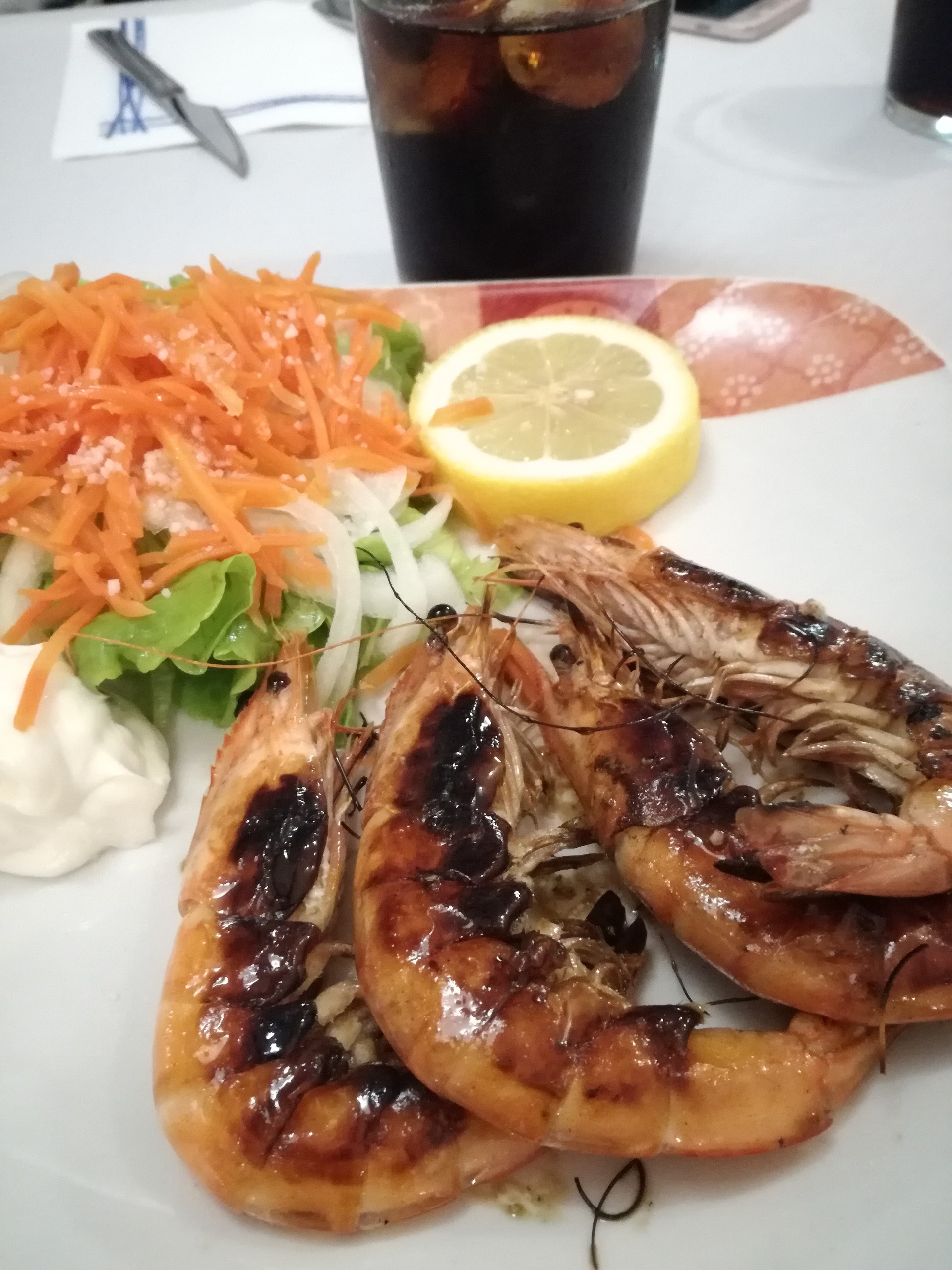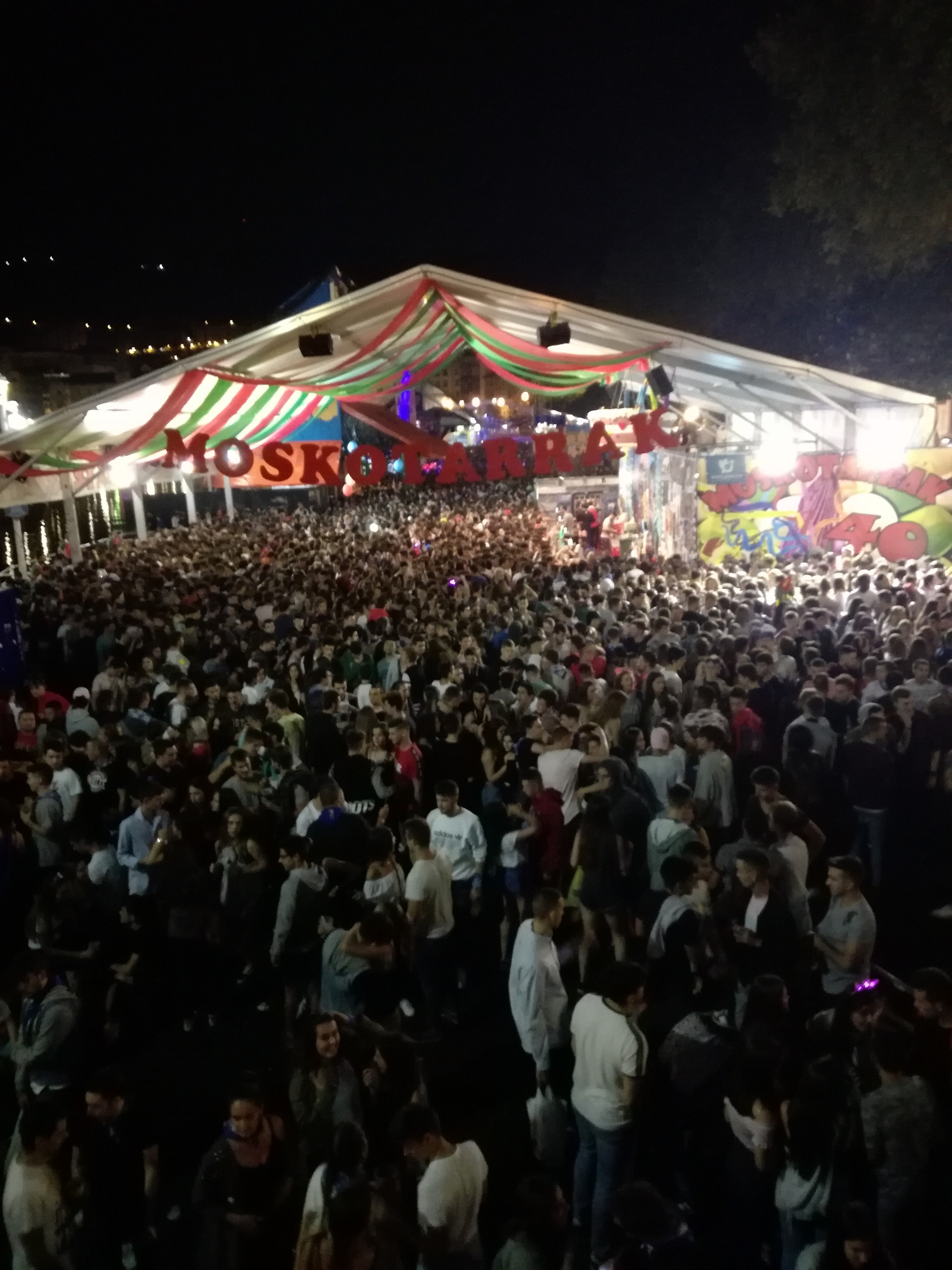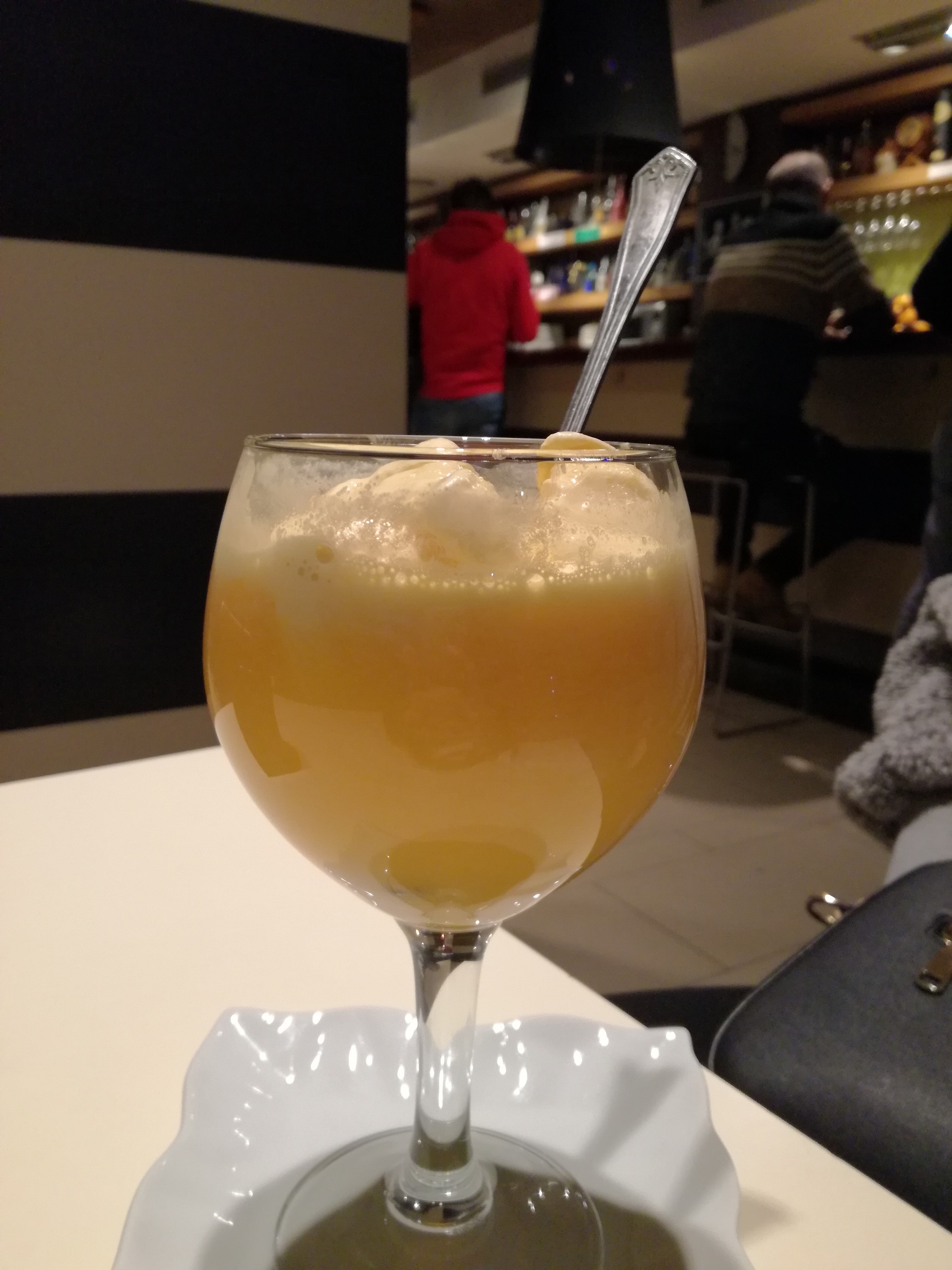Are Basque stereotypes true or false?
Hello everybody! Today, once again, I'm bringing you a post related to the Basque Country and its people. The thing is, I've heard a lot of stereotypes about Basque people throughout my life and many of them aren't true. That's why I want to set them all out today to confirm or deny them. I hope you like this article!
1. We eat a lot
This stereotype is prevalent throughout Spain, and even more so now thanks to the film Ocho Apellidos Vascos ("The Spanish Affair" in English), where the characters go to a restaurant where there's a restaurant serving a menu with eight obligatory courses, plus dessert.
This is a huge exaggeration. We don't eat eight course meals, we don't even eat four. We normally eat a starter, two dishes and a dessert. At times like New Year, we might have five courses (you can see what a New Years evening meal in the Basque Country looks like here), but normally we have two. It's the same in restaurants. Two dishes, three in some restaurants. The only time I've eaten three dishes in a restaurant was in Asturias, honestly.
However, it's true that we eat well in the Basque Country. The bars are full of pintxos and they make well-filled sandwiches. Meat chops are normally big too, as is the fish, pasta, or seafood, and the flavour is, as a rule, addictive. However, there are restaurants that serve little food, as I have experienced myself. But you get these all over Spain.

2. They don't have sex much
This obviously depends on the person, not where that person is from. It may depend on their ethnicity or culture, but not on whether or not they are Basque.
If we focus on women, there are two types in the Basque Country: The easy ones, and the not so easy ones. As is the case everywhere else. There are women who get straight to the point and others who prefer to wait, are unprepared or choose not to for personal reasons. Obviously, the situation changes according to the context.
It might be easier to pull in a known "party area", than it is to pull someone walking down the street going about their daily business.
I know a lot of girls who aren't as closed off as this cliché labels them as. Every girl does what they want with their bodies. If they think the drooling men behind them aren't worth it, of course they'll be closed off and want nothing.
Basque women have good taste, not a closed mind. They have confidence in themselves and they know themselves. If they know what's good for them and what's not, they'll know when to sleep with someone.
But this doesn't mean the rest of Spain is promiscuous either. Don’t get me wrong. I'm just saying that Basque women are like everyone else: they decide who they do and don't want to sleep with. I can already imagine the type of guys who make this stereotype go viral are...
3. The Basque language is very hard
It certainly isn't to me. I've been speaking it since I said my first word, so it's not hard for me. I also know people from abroad, from Africa and Poland (my English teacher, for example), who didn't grow up here but speak the language well.
The difficulty of a language is relative. For the Spanish and other speakers of Romance languages, it can be very difficult, as the structure of the sentences is different and the prepositions are joined with the nouns, merging as suffixes. But it depends on your linguistic ability.
For the Basque people (from Bilbao, Vitoria, Santurce or another municipality) who don't have Basque as a mother tongue, it can seem very complicated as well as a nuisance, because an official qualification in Basque is becoming increasingly more requested in the working world. But if they really want to learn it, motivation and commitment are key.
Nothing's impossible.
4. There are a lot of Basque dialects, so its speakers can't understand each other
This can be true, since many people speak Euskera batúa (standard Basque), especially people from Bilbao. For them, trying to understand a Basque speaker who speaks one of the living Basque dialects might be hellish.
Furthermore, lots of people from Bilbao and other big cities say that the dialects are a "weird basque" which is impossible to understand. Weird? Someone should remind them that the basque they speak is technically an artificial language, seeing as it was a creation based on other dialects. They should also be reminded that standard Basque is the least spoken in the whole Basque country since all those who speak the language as a mother tongue speak some dialect or variation. I speak the Biscayan dialect, but there are many others such as Guipuzcoan, Alto Navarro, Labortano, Sulentino or Bajonavarro. Which Basque is the weird one now?
But it's also true that sometimes it's almost impossible to understand another person who speaks a totally different dialect, such as the sulentino, a dialect spoken in France. But it's not just the dialect, it's the ways of speaking that every group of people has. Biscayan is not the same in Gernika, as in Bermeo, as in Lekeitio. Although these three municipalities are very close to each other, the way they speak in Basque is completely different. For this reason, we Basques call these ways of speaking "subdialects", each with its own name: Gernikarra, Bermiotarra (or Bermeotarra) and Lekittarra. There's also Ondarrutarra, Mutrikutarra, Oñatitarra, etc.
But it's just a matter of getting used to them. On my university course, I have colleagues from different parts of the Basque territory: Pamplona, Basauri, Donostia, Irun, Zarautz, Ondarroa, Tolosa, etc.
Each and every one of them speaks in a different way. Some in batúa, others in their own dialect. At first it was a little difficult to understand what they were saying. As words like "joan" ("Go") became "fan", and there were differences in both vocabulary and phonetics. There are also a lot of words I use which the others don't understand, like "koitxaue" ("poor guy". In standard Basque it would be called "gaixoa"), " gatza "("difficult". In standard Basque it's "zaila", and gatza would mean "salt") or "motza" ("ugly". In standard Basque it's "itsusia", and motza would mean "short").
But it's all a matter of time. Anything can be done.
5. The strong accent
This also depends on the area. If the speaker is from a coastal or mountainous area, they may have an accent. Nobody ever told me that I had a basque accent until other people who weren't from my neck of the woods (people from Bilbao or Durango) told me I did. I thought that was quite odd. The basque accent is defined by the melodic tune with which we ask questions or make exclamations. In terms of normal speech, it's defined by a light enthusiasm.
But not everyone has this accent. Although many people think that the Bilbao accent is excellent, only a portion of elderly people have it. A lot of young people from Bilbao have never developed this accent. Although it's true that many, even though they never speak the Basque language, do have this accent.
But it's not usually a very strong accent, at least it isn't among young people and women.
6. Long surnames
This isn't a stereotype. It's a true fact. Basque people can have very long surnames, but it's not something you see often. In many cases, surnames usually end in-etxea ("casa"), like many Spanish surnames end in -ez. With this suffix, surnames can be different lengths: they can be short, like Goikoetxea (The house above), or they can be long like Malaxetxebarria, Ostaikoetxea or Merikaetxebarria, or they can be even longer like Iturrigorrigoikoerrotakoetxea ("The red spring of the windmill house from above").
Many surnames start with "Z", something very common in the Basque language. Examples include: Zenarruzabeitia, Zenigaonaindia, Zarrabeitia, Zulueta or Zallo. Many other surnames are names of municipalities or Basque councils, such as Azkarate, Elizondo, Elejalde, Elorriaga, Arrieta or Areitio.
Others may have surnames basedon landscapes, such as Zelaia ("meadow"), Iturri ("spring") or Zubialde ("the side of the bridge"), and so on. The list is endless.
In conclusion, some surnames may be long with many syllables, but not many people have the privilege of possessing them. I only have three: Merikaetxebarria, Zenarruzabeitia and Gabikagogeaskoa. The others are fairly short. Yes, I have eight last names.
7. We talk loudly
It also depends on the person. When we get angry, yes, we speak loudly. We go a little bit over the top. But otherwise, it's very relative. I, for example, do tend to speak quite loudly. But many of my friends are the complete opposite.
Therefore, there it's neither true nor false, there are those who do speak loudly and those who don't. Of course, if you want to make a fool of yourself, embarrass someone or be the center of attention, the tone of voice can be very loud.
Don't get me started on the irrintzis. They're those loud cries used in the past as a means of communication between shepherds. Today they're used in important events related to the Basque tradition, Basque music concerts, and usually in the romerías.
8. Politics and hispanophobia is in our blood
Get this idea out of your heads. Starting now.
Just because a few have this mentality doesn't mean all Basque people do. There's no need to generalise. Although I have to say that many Basque people, when asked about their nationality, say they're Basque instead of Spanish. But it's not a sign of our craving for independence. It's like saying I'm Galician, Extremadura or Andalusian. Same thing.
At least from my point of view it is.
9. Aupa, Patxi and other words
Nothing but myths. I can confirm that some of these are used, such as Aupa (a way of saying "hello"), is used quite a lot in Gipuzkoa. We use "pues" to the point of exaggeration and we also say "me cago en dios", or "kabenzotz" a lot too. But Patxi? I don't know anyone with that name. I do know an Iñaki, but not a Patxi.
Another very stereotypical basque phrase is "Ahí va la hostia" o " Aiba la ostia!" I've only heard them in those Basque jokes. Maybe I heard someone say it once, at some point in my life. It is true that we use insults a lot (though not with the intention of offending anyone. At least most of the time) and use words like "joder", "hostia", "coño" and many others. I don't deny that. But phrases like" Aiba la ostia " are purely stereotypical rubbish.
10. The weather
This is true. It's normally cloudy, wet and cold. Why do you think we have such green mountains? We have some advantages due to our weather. While Madrid suffers from issues of pollution, we don't see a single trace of it here.
Winters are very harsh, particularly so depending on the area. Vitoria, for example, has very harsh winters. Although people from Vitoria have told me that Gernika is very cold too. Well, not more-so than Vitoria.
Other characteristics of the weather in the Basque Country is fog, clouds, rain, storms, snow and hail. But don't be frightened, it doesn't last long. It snows mostly on the mountains and the surrounding municipalities. In my city, it only snowed once last year. It snows more often in Vitoria.
In terms of the rain, we don't get rid of it even in summer. I still remember when it rained for several days in the middle of August. But the weather can be good, too, with the temperature being equal to those in Murcia, for example. Not as hot as Seville though.
The wind is another enemy of ours, although I like it. Usually, there's a breeze, which is lovely. But it's not so great if you're spending the day at the beach, it makes the air feel cooler which isn't nice if you're sunbathing. But this isn't a problem for us, seeing as in the summer we take over cities like Benidorm, Salou cities in Landes. That's a fact too.
11. Bilbao is the only city in the Basque Country. Everywhere else is a suburb, or a rural region
This stereotype, unfortunately, is held not only among Spanish society but also among the people of Bilbao themselves. I know people who think that's true, just because they've never left "Gran Bilbao" and have never been interested in exploring the rest of the Basque territory. A very well-known stereotype which is, quite frankly, true, is that a lot of people from Bilbao think that Bilbao is the centre of Euskadi (The Basque Country). That there's nothing else out there other than cows and sheep. But as I said before, it depends on the person. But the amount of people who think this way is relatively high.
Well, this is for the people of Bilbao, as well as for the Spanish people who have the same mentality: Bilbao can be very attractive, a city full of interesting things and good food, but it's not the most visited city by tourists. Perhaps you've never heard of Donostia-San Sebastián or Vitoria-Gasteiz? They're beautiful cities with a lot of cultural value.
There are also many other cities throughout the Basque Country, such as Durango, Mungia, Zarautz, Bergara or Balmaseda. You can see and learn a lot in these cities. Coastal villages such as Armintza, Pasaia or Saint Jean de Luz (in France. Remember the historical Basque territory includes the Basque Autonomous Community, Navarra and the French Atlantic Pyrenees) have beautiful views of the sea as well as lovely streets. There's also Hondarribia, Mutriku or Elizondo.

Other municipalities, hidden by mountains, also have their own charm. For example, Sare, Oñati, Ochagavía and Amurrio. Other beautiful tourist attractions are Machichaco Cape, the North Gulf, Karrantza, Urkiola, etc. It all depends on how long you want to stay in the car. After all, you know it'll be worth it.
If you want to know more about the Basque Country region, don't miss out on these three publications: the Vizcaína coast, the Guipuzcoana coast y the Labort coast.
12. We're all violent terrorists who are members of ETA
Thank God this stereotype is staying in the past... just like ETA (Basque terrorist group) has after it's disarmament on the 17th May 2017. We were not members of the group before that date, nor after.
If you don't believe me, go online and check if the group had been made up of two million people (not counting the population of Navarra and French Basque Country).
This is a subject that, personally, winds me up. Once, somebody asked me if I was a member of that group (yes, they were being serious). I don't appreciate being put in the same box as ETA. This association is similar to what often happens to Muslims.
13. Female personal hygiene and beauty
This depends on the cultural tradition of the locality and its influence on the individual. If you go to Vitoria, Bayona, or Bilbao for example, you'll find all kinds of people. However, the majority of people dress elegantly, with branded or casual clothing, or with clothes from places like Bershka. You'll also find people with emo, goth or hipster styles, wearing clothes from markets or that they got second hand. They can look quirky, sophisticated, sexy etc., etc. There are all kinds of people, not just in the bigger cities, but all over the Basque Country.
But this stereotype comes from the existing basque nationalist ideology and the typical style of clothing that activists often wear. They usually wear jeans or black tracksuit bottoms, basic t-shirts, or t-shirts with logos and revolutionary designs, hoop earrings and maybe a neckerchief around their neck or in their hair. They sport various hairstyles, among them: the bun, the quiff or a type of fringe called "hachazo". Some call them" abertzales", some call them "borrokas", and others call them "punks". This type of style is found all over the Basque Country, and can be seen both in small municipalities and big cities. But this just one kind of style, out of everything that exists in the Basque Country. You don't have to put everything under the same umbrella.
As for personal hygiene, it all depends on the individual person. Though only a small portion of the population (almost) never washes and smells bad. I've never thought of someone like this being the norm. Normally, Basque people like to be clean and tidy. As for the idea that "women don't shave their armpits", it's time for armpit hair to stop being something "unnatural" and allow women to do whatever they want with their appearance. I imagine it's not only in the Basque Country where women don't shave their underarms.
14. We're gossips
I'm not saying we're not. My village has a reputation for being full of gossip. I inherited this trait.
15. We only listen to basque music
We listen to quite a variety of music. We listen to rap, trap, reggaeton, techno, pop, rock, ska, electronic, dance, ballads, hip-hop, alternative... There is no one genre that defines the whole population. However, every party in the Basque Country has Basque music, and it's something that most of us like a lot. We are proud of our roots and our music. Although I can't generalise that opinion either.
16. We're obnoxious
At first, we may seem so. We might even seem reserved, dull and shy when we're dancing. But once we've gained our confidence, you'll realise we're not.
But, of course, everyone's different. Many Basque people are very social and very open. They can be a bit crazy, and not afraid to make a fool of themselves.
We're also nice and very understanding. We're not usually grouchy or conceited. People throughout the Basque Country will show you generosity and hospitality. This is something that, one way or another, has its charm.
Note: we're not rude, we're just honest.
17. We drink a lot
Partying is sacred to us. Wherever there's a party, no matter how far it is, we'll be there. Throughout the year, Euskadi celebrates hundreds of festivals, most of them with great success. New Year's Eve is normally a big night. There are a lot of pubs and clubs in the big cities, and at this time of year, there are jammed packed at the doors.
We also have many other festivities, such as the Carnivals (Tolosa's are incredible), "40 Minutu Rock" (a rock festival held in Durango every year at the end of February), HTX Rock (held in Navarra), "Astelehentxutxu" and "Urriko azken astelehena" in Gernika (October), "Euskal Jaiak" ("The Basque festival", held in September and the best known are the ones in Donostia and Zarautz), "Madalenak" (in Elantxobe, Bermeo, Mutriku... on the 22nd of July), "Aste Nagusia" (at the end of August, in Bilbao), the Semana Grande de Donostia, the San Fermines, "< strong>Azule Shoe" (Ondarroa), Santo Tomás (a very important day throughout the Basque Country. Held on the 21st of Decembre), etc.
In addition to all these important dates, we have the festivals of the localities and municipalities, as well as La Semana Grande de Donostia: Fiestas del Carmen (Santurtzi), Fiestas de la Blanca (Vitoria), Fiestas de Amorebieta, Durango, Getxo, Arrasate, Andoain, Antzarrak (Lekeitio), Eibar, Azpeitia, Mungia, Barakaldo, etc.
And to top it all off, we also have school festivals. These are festivals held at the end of May (depending on the province), and each year they are held in a different municipality, hosted and organised by a different school. These festivals are often attended by people of all ages from all over the Basque Country, and they are a really important part of our culture. There are also several musical groups and artists involved, with the aim of livening up the crowd. There are also several activities for kids and adults alike.

In every province, there's a different school festival: in Biscay, it's called Ibilaldia and it's celebrated at the end of May. This year it will take place in Lekeitio. In Araba they call it Araba Euskaraz, and this year it will be held in La Puebla de Arganzón. In Navarra, it's called Nafarroa Oinez. It's celebrated in October and this year it takes place in Tudela. In Gipuzkoa it's called Kilometroak and it will be held in Zarautz. Finally, in the French part of the Basque Country, it's called Herri Urrats and it's celebrated in the Lago de Senpere every year. Each and every one of them has been created to encourage the use of Basque and its use in public spaces.
In general, we do like to party. Aside from all these festivals, there's usually a lot of life in the streets every Saturday until the early hours of the morning. We always have some excuse to party and drink. Therefore, that stereotype may actually have a little truth behind it. But it's not completely true either, as we don't drink to excess, although everyone handles their drink differently.

18. We're dumb
This is our top stereotype, and I can say that there's some truth to it. We're not as dumb and primitive as many think, but we do have something of the sort in our DNA.
It's true that we have very strange sports, like lifting 300kg stones or cutting firewood, and sometimes barbaric things like bull running, or "Idi Probak", where Oxen are made to drag heavy stones. But Spain can't say anything about this, since it has its own barbaric "sports", like the bullrings or throwing goats from bell towers.
Nor are we crazy strong, few can lift the 300kg stones. We can be dumb when it comes to deciding to act on an idea (we often have so many "bright ideas" that we can act on a lot of them and not regret having carried them out). We can also be coarse and shameless, but we are good people. Don't let appearances fool you.
Society is becoming more and more "politically correct", so, little by little, Basque society is leaving behind its "coarse and primitive personality". Although we're not that primitive.
And that's it for today's post! I hope you've found this interesting and that any preconceived ideas and doubts you had about the Basque people have been cleared up. If you want to clear up any more queries, there's an easy way to do it: come visit us! Travelling opens the mind in a way that reading this article cannot.
Thank you for reading and see you next time!
Photo gallery
Content available in other languages
Want to have your own Erasmus blog?
If you are experiencing living abroad, you're an avid traveller or want to promote the city where you live... create your own blog and share your adventures!
I want to create my Erasmus blog! →



















Comments (0 comments)